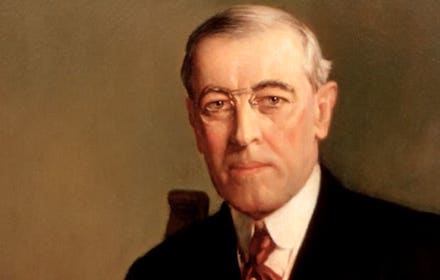www.aljazeerah.info
Opinion Editorials, July 2020
Archives
Mission & Name
Conflict Terminology
Editorials
Gaza Holocaust
Gulf War
Isdood
Islam
News
News Photos
Opinion Editorials
US Foreign Policy (Dr. El-Najjar's Articles)
www.aljazeerah.info
Woodrow Wilson's Racism: The Basis for his Support of Zionism By Lawrence Davidson Redress, July 26, 2020 |
 |
 |
|
Woodrow Wilson (1856-1924) was born in Staunton, Virginia, to Christian fundamentalist parents – his father was a Presbyterian minister – who supported the Confederacy during the Civil War. Thus, Wilson grew up and was educated in the segregated American South. This upbringing imbued him with both a literal interpretation of the Bible and a lifelong racist outlook which he brought with him to every position, every office he ever held. For instance, while he served as president of Princeton University (1902-08), he refused to allow the university to admit African Americans. Despite his racist orientation, Princeton subsequently named a School of Public Policy and International Affairs, sub-colleges and buildings after Wilson. Today, in the wake of uprisings against not only police brutality towards African Americans and other minorities, but also America’s racist legacy, Princeton has removed Wilson’s name from these institutions and buildings.
Wilson went on to become the 28th president of the United States (1913-21). He led the United States into World War I, was instrumental in the founding of the League of Nations, appointed the first Jewish member of the Supreme Court and, notably, facilitated the eventual establishment of a “Jewish national home” in Palestine through his support for the Balfour Declaration (1917). At the time he remarked: “To think that I, son of the manse [minister’s house], should be able to help restore the Holy Land to its people.” Subsequently, this decision made him as much a hero to Zionists, and American Zionists in particular, as he was a villain to African Americans.
The Zionist dilemma
Given today’s reaction against the country’s historical racism, American Jews’ understanding of Wilson’s legacy is being debated. The challenge for Zionists is to save Wilson’s heroic image without totally disregarding his racist record. An attempt to do just that came in an essay, recently published on 2 July 2020, in the American Jewish newspaper the Forward. The essay is entitled “Woodrow Wilson was a hero to Jews. What should we do with his racism?” and was written by Jonathan D. Sarna, a Brandeis University professor of American Jewish history.
Sarna notes both facets of Wilson’s career. On the one hand, “The Jews of his day considered Wilson a hero and a saviour, a man of principle and ethical uprightness.” On the other, African Americans “learn a totally different narrative” wherein “Wilson … staunchly defended segregation and characterised Blacks as an ‘ignorant and inferior race’.”
Sarna seeks to square this circle by retreating to a frankly banal apologia: ”Many a flawed hero accomplished great deeds and changed the institutions and nations they led for the better… They remind us that good people can do very bad things – and vice-versa.” This is poor consolation for African Americans. It also turns out to be a shaky basis for Jewish admiration of Wilson. This is so because the alleged good Woodrow Wilson did for the Jews – his support for the Balfour Declaration – was based on the same racist foundation shaping his behaviour toward African Americans.
Wilson supports the Balfour Declaration
What is the connection between Wilson’s racism and his support for the Balfour Declaration? The president was a European race supremacist, or what today would be called a “white supremacist”. As he saw it, African Americans were not the only “ignorant and inferior race” out there. All the non-European peoples, such as those of the Ottoman Empire, including Palestinians, qualified for this designation.
On 8 January 1918, in the run-up to America’s entrance into World War I, President Wilson announced his “Fourteen Points”. These were the nation’s war aims – notions around which to rally the American people. A major theme that runs throughout these “points” is the promise of self-determination for peoples then under the rule of the enemy Central Powers: Germany, Austria and the Ottoman Empire. Referring specifically to the last-mentioned, point twelve reads: “The Turkish portion of the present Ottoman Empire should be assured a secure sovereignty, but the other nationalities which are now under Turkish rule should be assured an undoubted security of life and an absolutely unmolested opportunity of autonomous development.”
Such a promise, of course, included the Arabs of the Ottoman province of Greater Syria, which in turn included Palestine and its indigenous population. This pledge might seem to conflict with Wilson’s racist outlook, but one has to keep in mind that point twelve was meant as a propaganda piece in support of the broader claim that America was joining a war to make the world safe for democracy. As a vehicle for arousing the enthusiasm of the American people, it was effective. However, it transformed itself into something problematic as soon as Wilson got to the Paris Peace Conference in 1919. US allies Britain and France wanted to incorporate most of the Ottoman lands, which they considered the spoils of war, into their own existing empires, and so objected to point twelve.
Because of his European supremacist point of view, Wilson really had no deep objections to this expansion. The question was how to go along with his allies’ wishes while still appearing to honour the Fourteen Points. He achieved this goal in a way that also meshed with his racist worldview. He and his allies established the Mandate System. Real self-determination was now to be reserved for the European peoples previously belonging to the German, Austrian and Russian empires. For instance, Poland and Serbia, among others, were to be “accorded the freest opportunity for autonomous development”. Non-European peoples were viewed as unprepared for this reward. They were to be placed under the tutelage of a “mandatory power”, which in the case of most of the Arab lands meant either Britain or France. Such imperial powers, in turn, were to instruct these inferior peoples in the art of self-government. It should come as no surprise that Palestine was given over to the British as a “mandate territory”. Indeed, the Balfour Declaration was incorporated into the preamble and second article of the mandate document for Palestine.
Back to Sarna’s suggestion
Woodrow Wilson supported the Balfour Declaration because he was a Christian fundamentalist who believed that God desired the Jews, whom Wilson understood to have been civilised through long residence in the West, to “return to their ancient home”. The instruments for that return were the Balfour Declaration and the British mandate. The Palestinians were not even relevant to the issue for Wilson.
Given this history, what do we learn when, as Sarna suggests, we “probe more deeply into [our hero’s] flaws”?
It is now recognized that Wilson’s major flaw was his racist worldview and the behavioUr that flowed from it. This racism was the basis of his mistreatment of African Americans. As it turns out, that same racist outlook was part of the basis for his support of the Balfour Declaration – the very act that makes Wilson a hero for both past and present Zionists.
Now we come to the second part of Sarna’s suggestion, that an examination of the hero’s flaws “invites us to think harder about our own flaws”. What are the resulting implications of such a self-examination for today’s Zionists?
What sort of flaw in ourselves should an examination of Woodrow Wilson bring Zionist Jews to consider? The fact is that contemporary Israeli Jewish and Zionist attitudes toward the Palestinians in many ways mimic those of Woodrow Wilson towards African Americans. If we are to consider Wilson’s racism a flaw from which Jews too can learn, the consequence must be a reconsideration of the inherently racist Zionist attitudes and policies towards the Palestinians.
I do not know if Jonathan Sarna really meant to inspire a serious assessment of Israel’s and Zionism’s flaws through the re-examination of those of their champion, Woodrow Wilson. However, such an assessment would certainly reveal a shared racism. Wilson never ceased to be a racist and, at least since 1917, the Zionists have been following his “heroic” model. How many of them can be counted upon to take up Sarna’s suggestion and look into this shared historical mirror in any honest way?
https://www.redressonline.com/2020/07/woodrow-wilsons-racism-the-basis-for-his-support-of-zionism/
***
Share the link of this article with your facebook friends
|
|
|
|
||
|
||||||


